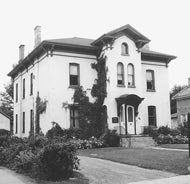History
In January of 1940, the first classes of Emmanuel Bible School began in the basement of the Mennonite Brethren in Christ (MBC) church in Stouffville, Ontario. Soon, the growing school needed larger quarters, and in 1943 moved to downtown Kitchener. By 1948, the need was felt to formalize the programs of the institution and to increase its academic emphasis. As a result, degree programs began to be offered at the new Emmanuel Bible College. Another period of growth led to the school’s move in 1964 to the site of the denominational conference grounds in SE Kitchener, where it remains today. Accreditation followed in 1982.
The MBC, later called the United Missionary Church and, by 1969, the Missionary Church, was one of a constellation of related denominations of immigrant Mennonite heritage who were influenced by the revival movements of the 19th century and who held a desire to find their place in developing society. In 1993 the Missionary Church in Canada merged with the Evangelical Church in Canada to form the Evangelical Missionary Church in Canada.

Beliefs and Governance

The founding denominations of the college granted to it an Anabaptist perspective along with a strong missionary zeal and a keen emphasis on the role of the Holy Spirit in the life of the individual. Emmanuel maintains an organic connection with the Evangelical Missionary Church of Canada and also partners with a number of denominations including Be in Christ Church of Canada, Christian and Missionary Alliance, the Congregational Christian Churches of Canada, Mennonite Brethren, and the United Brethren in Christ Canada.
The majority of the Board of Governors come from the Evangelical Missionary Church of Canada (EMCC) with the balance of members drawn from our denominational partners. Governors serve for a maximum of three, three-year terms and bring a variety of professional expertise and experience to the board table. Emmanuel adopted the statement of faith of the Evangelical Fellowship of Canada so that the broader Christian community has access to the teaching and heritage of the College. The breadth of enrolment at the school attests to its openness to accommodate those from other traditions, and up to 30 denominations are represented in our student body.
